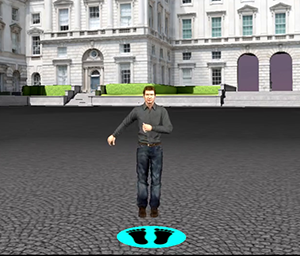The Impact of a Virtual Agent’s Non-Verbal Emotional Expression on a User’s Personal Space Preferences

Virtual-reality-based interactions with virtual agents (VAs) are likely subject to similar influences as human-human interactions. In either real or virtual social interactions, interactants try to maintain their personal space (PS), an ubiquitous, situative, flexible safety zone. Building upon larger PS preferences to humans and VAs with angry facial expressions, we extend the investigations to whole-body emotional expressions. In two immersive settings–HMD and CAVE–66 males were approached by an either happy, angry, or neutral male VA. Subjects preferred a larger PS to the angry VA when being able to stop him at their convenience (Sample task), replicating previous findings, and when being able to actively avoid him (PassBy task). In the latter task, we also observed larger distances in the CAVE than in the HMD.
@inproceedings{10.1145/3383652.3423888,
author = {B\"{o}nsch, Andrea and Radke, Sina and Ehret, Jonathan and Habel, Ute and Kuhlen, Torsten W.},
title = {The Impact of a Virtual Agent's Non-Verbal Emotional Expression on a User's Personal Space Preferences},
year = {2020},
isbn = {9781450375863},
publisher = {Association for Computing Machinery},
address = {New York, NY, USA},
url = {https://doi.org/10.1145/3383652.3423888},
doi = {10.1145/3383652.3423888},
abstract = {Virtual-reality-based interactions with virtual agents (VAs) are likely subject to similar influences as human-human interactions. In either real or virtual social interactions, interactants try to maintain their personal space (PS), an ubiquitous, situative, flexible safety zone. Building upon larger PS preferences to humans and VAs with angry facial expressions, we extend the investigations to whole-body emotional expressions. In two immersive settings-HMD and CAVE-66 males were approached by an either happy, angry, or neutral male VA. Subjects preferred a larger PS to the angry VA when being able to stop him at their convenience (Sample task), replicating previous findings, and when being able to actively avoid him (Pass By task). In the latter task, we also observed larger distances in the CAVE than in the HMD.},
booktitle = {Proceedings of the 20th ACM International Conference on Intelligent Virtual Agents},
articleno = {12},
numpages = {8},
keywords = {personal space, virtual reality, emotions, virtual agents},
location = {Virtual Event, Scotland, UK},
series = {IVA '20}
}

